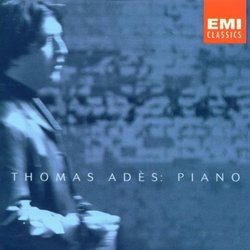A composer pianist's insights.
Donald S. Maier | Campbell, Ca United States | 01/17/2001
(5 out of 5 stars)
"Thomas Adès is certainly among the most original and compelling composers in today's public eye. In this recording, he demonstrates how a composer with the requisite performing skills can illuminate music in ways that might elude the "mere" performing virtuoso. But make no mistake, Adès is no mean pianist: The musical world first noticed him as a pianist when he took Second Prize in the 1989 BBC Young Musician of the Year contest.This free-ranging recital includes no virtuoso showpieces. And most (if not all of) the pieces will be unfamiliar to most listeners. But each of them has a compelling musical purpose that Adès finds and places on display for our listening pleasure. Even the juxtaposition of pieces in the recital serves this end.Special mention should be made of Adès' performances of the Kurtag and Nancarrow pieces. The Kurtag miniatures, from his "Playing Games" are filled with wonderful humor and poignancy that Adès obviously relishes. (Check out "The Mad Girl with the Flaxen Hair", an hommage to Debussy.) These "simple", short works are rarely performed on or off record; the current disc may be worth hearing for them alone.The Nancarrow canons are outrageously original and slyly humorous takes on this ancient form. While not "virtuoso music", they are nearly impossible to play! But Adès does play them -- and in a way that upstages their dedicatee, Ursula Oppens (whose performance of two of them is available on another five-star disc: Music & Arts CD-4862). While Oppens seems to understand where the music is going and is a fine guide, Adès conveys the sense of knowing why the music goes where it does. So that for example, when the wild syncopations in one of the canons suddenly unfold into familiar jazz-inflected riffs, Adès finds and gets into this groove, and brings us into this familiar world for the brief moment that it lasts. Oppens, on the other hand seems more the detached observer letting it pass by.In sum, this is a disc for anyone not afraid of the unfamiliar, who doesn't equate musical excellence with overt virtosic display.The recorded sound is excellent, providing a warm, but very clear (essential for the Nancarrow!) acoustic."
Unfamiliar but highly listenable modern classical piano work
Neal C. Reynolds | Indianapolis, Indiana | 07/10/2002
(5 out of 5 stars)
"First, it's easy to recognize Thomas Ades as a master interpreter of 20th century piano classics. And it is a full span of the 20th century from the 1902-03 Norwegian Dances to Castiglioni's "How I Spend The Summer" by a composer only a year my senior, and Gyorgy Kurtag's "Jatekok".The concert starts with Castiglioni's "How I Spend The Summer", a work that can be played by very young piano students, but is a delight to adult ears, with its mixed and playful moods.That is immediately followed by Grieg's challenging Norwegian Peasant Dances, partly graceful and partly powerful and untamed melody and rhythm.Neo-classicist Alexey Stanchinsky's four-part Canon and his Piano Sonata in G are extraordinary works which have been described as Bach on the left hand and Scriabin on the right. A pity this brilliant talent lived such a pitifully short lifetime.As noted by another reviewer, the Kurtag work is a delight and very much to be listened to carefully to catch the playful allusions to Debussy, Tschaikowsky, Janacek, and (catch this) Nancy Sinatra. Janacek's music, like Grieg's, is pure folk, composed by Janacek and played by Ades as folk without classical pretensions. Ades continues with works by Busoni and Stravinsky, concluding with Nancarrow, another composer like Kurtag who was wildly original and humorous, apparantly matched only by Ades who performs them in like spirit.This CD can be an introduction to modern classics, or an addition to an advanced collection. In either case, this music will be new to most listeners, and is bound to be a delight."


 Track Listings (37) - Disc #1
Track Listings (37) - Disc #1